#Eleusinian Mysteries
Explore tagged Tumblr posts
Text
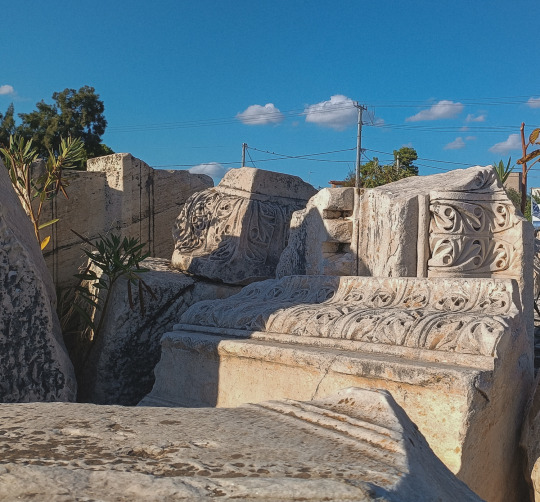
Pictures from the Eleusis archaeological site (by yours truly, taken today)
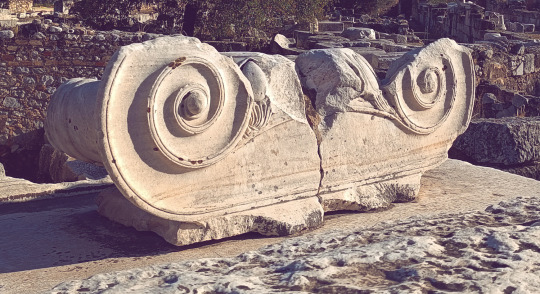
Below on the left is the well that was made on the spot where Demeter sat after several days of searching for Persephone, and where the locals found her. Right is a huge column. Pictures don't really do justice to the size of the broken pieces you see around. These were massive buildings.
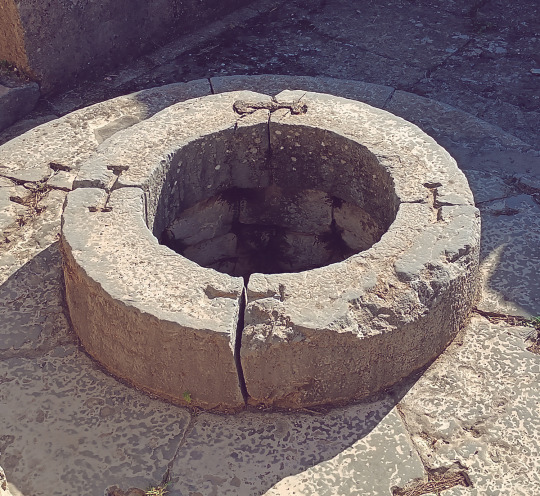
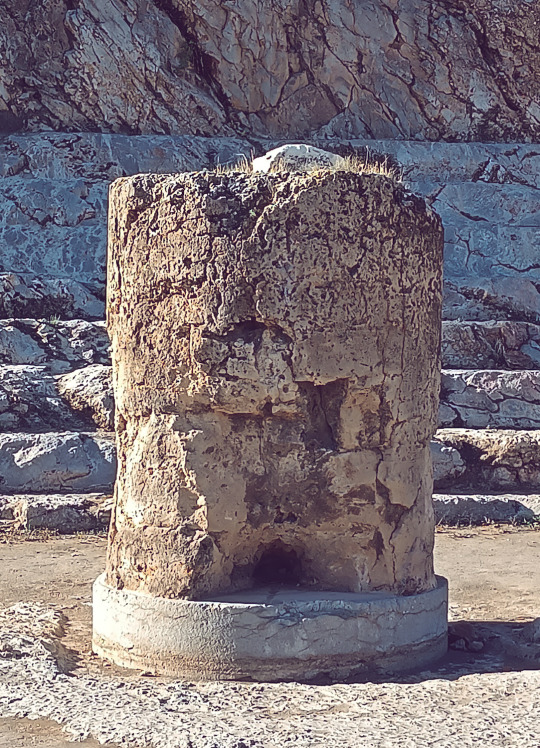
This flower which is everywhere:
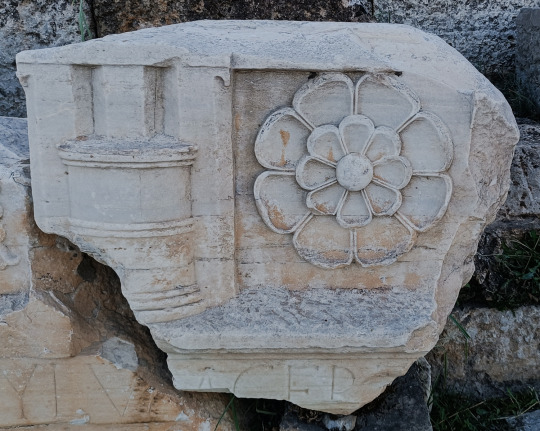
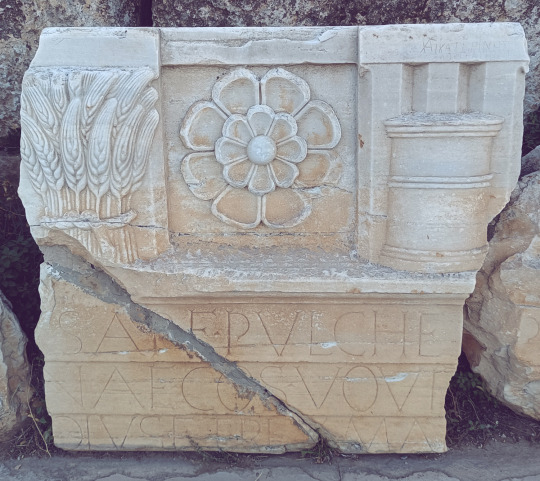
Omg chibi column i love you so much:
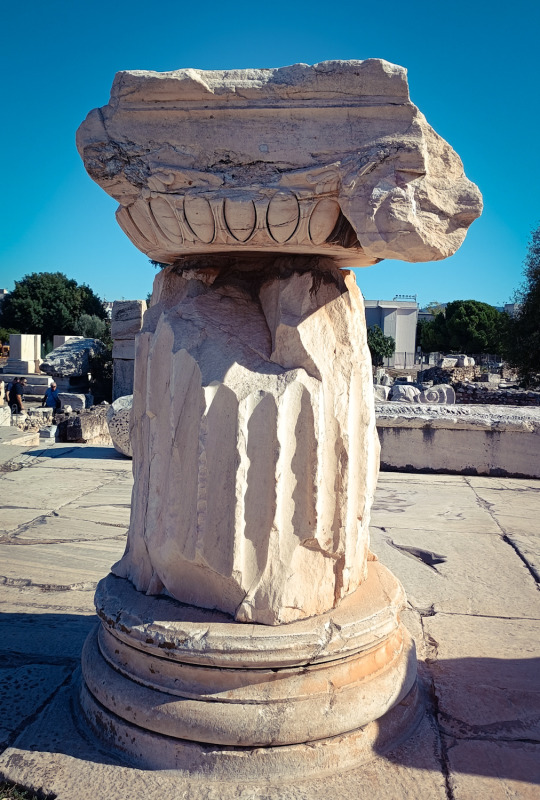
Assorted photos: (i was really struggling today to take pics because the sun was too bright, my phone was dying and there were a lot of people around.)
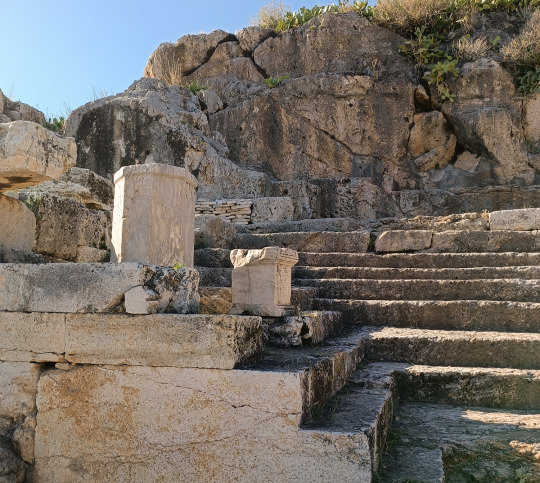
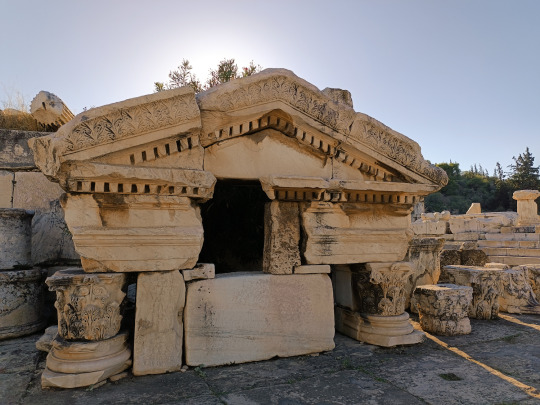
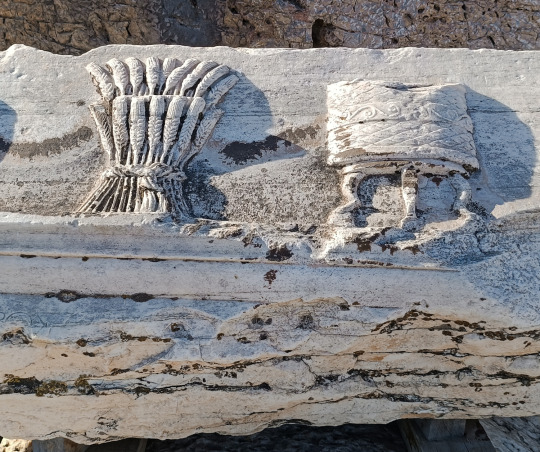
#ancient greece#demeter#Persephone#photography#greece#eleusinian mysteries#more to come later! i got lots more to show you
400 notes
·
View notes
Text
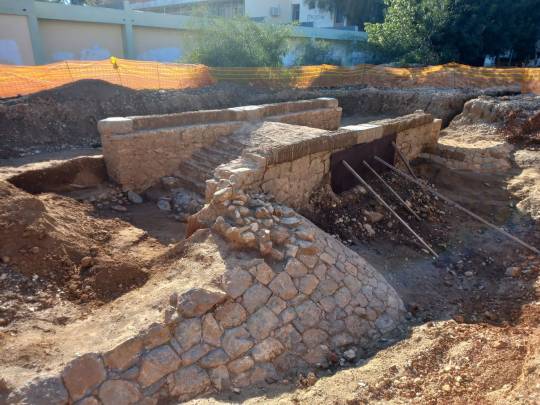
Ancient Roman Bridge Discovered at Elefsina, Greece
A Roman-era bridge was recently discovered in the ancient city of Elefsina, west of Athens during works for a suburban railway line.
The bridge was discovered by archaeologist Katerina Daskalopoulou and her team at a depth of just one meter below the surface close to the center of the modern city.
The team is currently examining the site to determine when the bridge was built and how it survived almost intact for over two thousand years.
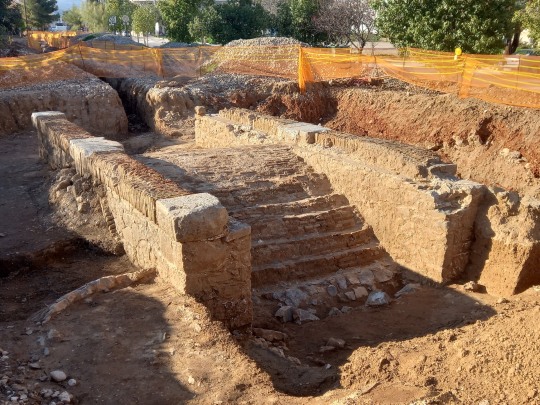
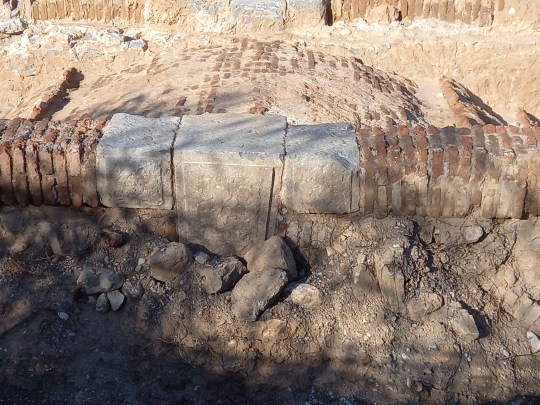
Roman Emperors and ancient Elefsina
The ancient city of Elefsina, also known as Eleusis in ancient times, is a city in Greece with a rich history dating back thousands of years. It’s most famous for the Eleusinian Mysteries, ancient rituals and ceremonies dedicated to Demeter and Persephone, which were among the most important religious events in ancient Greece.
The city itself was strategically located on the fertile plain of Thriasian, about 18 kilometers northwest of Athens. In addition to its religious significance, Eleusis was an important center for trade and politics in ancient Greece. It played a role in various conflicts and alliances throughout its history, particularly during the Persian Wars and the Peloponnesian War.
The Eleusinian Mysteries, however, remain its most enduring legacy. These rituals were celebrated annually, and participation was believed to bring spiritual benefits and a hopeful afterlife. The secrecy surrounding the Mysteries has left much of their details shrouded in mystery to this day.
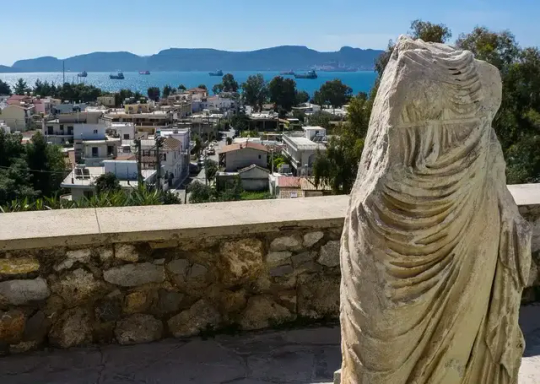
During Roman times, the city continued to be an important religious center, particularly for the Eleusinian Mysteries, which were embraced and supported by Roman emperors. The Romans, known for integrating Greek religious and cultural practices into their own, not only preserved but also enhanced the significance of the Eleusinian cult.
Several Roman emperors were initiated into the Eleusinian Mysteries, including Hadrian, Marcus Aurelius, and Julian the Apostate. Their support helped maintain the sanctuary’s prestige even as Rome dominated Greece. Hadrian, in particular, was a great admirer of Greek culture and contributed to Eleusis with construction projects.
Under Marcus Aurelius (161–180 AD), Eleusis saw significant renovations, including the construction of the Roman Triumphal Arch at the entrance to the sanctuary.
The Greater Propylaea, an impressive Roman-style gateway modeled after the Acropolis Propylaea, was built. The Telesterion, the main hall where the sacred rites were performed, was further developed.
In 2023 the ancient Greek city celebrated its ancient past by being nominated the Culture Capital of Europe.
By Tasos Kokkinidis.
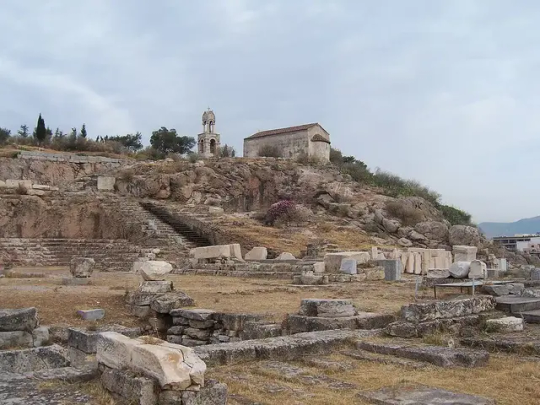
#Ancient Roman Bridge Discovered at Elefsina Greece#ancient city of Elefsin#Eleusinian Mysteries#ancient artifacts#archeology#ancient culture#history#history news#ancient history#ancient civilizations#ancient greece#greek history#roman emperor#roman history#roman empire
93 notes
·
View notes
Text
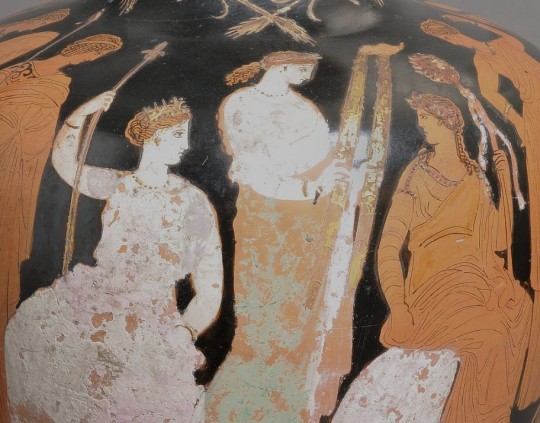
hydria, scene of eleusinian mysteries (detail) | c. 375 - 350 BCE | athenian, classical period
"In the center sits Demeter, goddess of agriculture, holding a scepter, her daughter Persephone grasping two flaming torches, having returned to Earth after six months in Hades. Dionysus, the god of vines and wine, sits on a rock. Their presence in this scene evokes the cycle of the seasons, as well as the cultivation of vines and wheat."
in the musée des beaux-arts de lyon collection
#why do dionysus and demeter look like they are beefing intensely?#ancient greece#athens#ancient athens#classical greece#athenian#attic pottery#eleusinian mysteries#greek art#greek mythology#demeter#persephone#dionysus
87 notes
·
View notes
Text
my two goals in this life which shall never be accomplished: 1) get absolutely shitfaced with alcibiades and 2) be initiated into the eleusinian mysteries
66 notes
·
View notes
Text

Classicstober day 7: Persephone 🌸
#flaroh illustration#tagamemnon#ancient history#ancient greece#greek mythology#persephone#eleusinian mysteries#proserpina#hellenic mythology#hellenic pagan#classicstober23#classicstober#classical reception
785 notes
·
View notes
Text
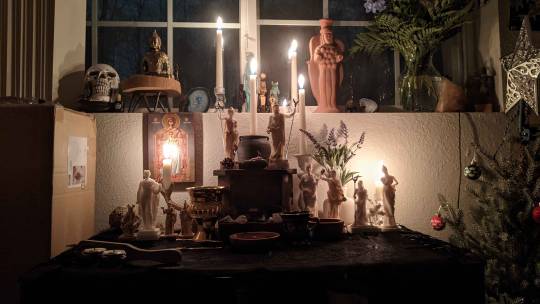
As yesterday marked the start of the Lesser Eleusinian Mysteries, I performed a ritual and libation in honor of the goddess Persephone. (Her statue is the one all the way on the lower right.) The Lesser Mysteries commemorate the return of Persephone from the underworld to the world of the living, thus ushering in the return of crops, flowering plants and greenery. Unfortunately winter is not yet officially over where I live, and everything's still covered in a thick blanket of snow.
#hellenic polytheism#hellenic pagan#greek polytheism#paganism#paganblr#hellenic paganism#religion#theoi#helpol#polytheist altar#altar#pagan altar#persephone#eleusinian mysteries#ritual
56 notes
·
View notes
Text
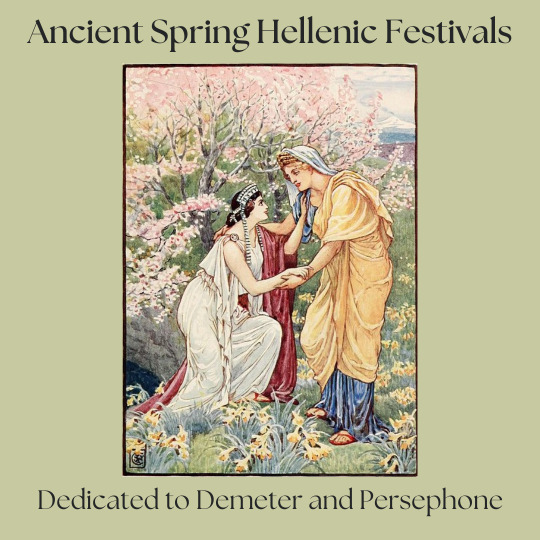
Spring equinox in ancient Greek religion signed the return of Persephone on earth and her reunification with her mother Demeter after the long winter period spent in the underworld.
Two were the main celebrations held in honor of Persephone during the spring season:
The Lesser Eleusinian Mysteries
The Lesser Mysteries were held annually in Agrae, on the banks of the Ilissos River and served as a preparatory initiation for participants who wished to undergo the Greater Mysteries in Eleusis later in autumn. These rites took place in the month of Anthesterion (February-March), traditionally lasting three days.
While the Greater Mysteries were focused on the myth of Demeter and Persephone, the Lesser Mysteries are believed to be mainly focused on Persephone, centering on purification and preparation. The three days ritual included
Purification and Sacrifices: Participants in the Lesser Mysteries would bathe in the sacred water of Ilissos River as a symbolic purification to cleanse themselves physically and spiritually. Pigs were sacrificed because of their association with Demeter and fertility, symbolizing the renewal of the individual. This act was intended to wash away any ritual impurity, making the initiates spiritually clean before they could engage in the more profound rites at Eleusis.
Mythic Reenactments and Instruction: Purification rites relate to the Katabasis, the descent into the underworld. This served as an allegory for the preparation needed before encountering divine truth. Initiates might have participated in reenactments or symbolically relived aspects of Persephone’s journey to the underworld.
Initiation: The Eleusinian mysteries were a cult related to eschatology and fertility, so initiates could be initiated on this occasion into the idea of life after death and perhaps it was an opportunity for young girls to be informed about the mysteries of marriage and sexuality.
As with the other celebrations of the Cult of Demeter and Persephone the rituals refer to the main aspects of worship: Eschatology, Women's Initiation and Agrarian Cycle.
Anthesphoria
Anthesphoria was a flower-festival, principally celebrated in Sicily, in honor of Persephone, in commemoration of her return to her mother in the beginning of spring. It consisted in gathering flowers and twining garlands, as the goddess did in the myth when she was carried off by Hades. The women themselves gathered the flowers for the garlands which they wore on the occasion. Anthesphoria were also solemnized in honor of other deities, especially Hera at Argos and Aphrodite at Cnossus, both under the name Antheia. Antheia has been compared with Flora the Roman deity, as the anthesphoria have been with the Roman festival of the Floralia.
The festival was in honor of Demeter and Kore as the two goddesses of poppy, flowers, spring, renewal and fertility.
#witchcraft#witchblr#witches of tumblr#paganism#pagan witch#wheel of the year#hellenic polytheism#ostara#eleusinian mysteries#persephone#demeter#demeter and kore#witches sabbath#springiscoming#spring equinox#italianwitch#strega
41 notes
·
View notes
Text
Day of Mourning
In antiquity, there may have been a day of mourning during the rites. This was meant to commemorate Demeter’s grief in the Homeric Hymn to Demeter. On this day many of the earthly pleasures were forbidden (including fasting for the day, with a specific meal in the night that consisted of cakes, corn, pomegranates, and a mixed wine/milk/honey) Participates offered red mullet and barley to her on this day.
In modernity I think that we can take some time out of our day to not only think of Demeter and her grief as a mother losing her daughter, but to think of the many women in our own history and to this day who loved and lost their daughters to patriarchal society and loveless marriage. I have little suggestions for specific ways to perform this, as this is just to sit down and remember; perhaps reading the Homeric Hymn to Demeter; Rape of Persephone, or learning about your own countries history of women’s rights and patriarchy.
Demeter and her grief are essential to her and Persephone’s mythology. Her grief caused our seasons and eventually our agriculture and way of life, grief caused great change on Olympus and for humanity, her stubbornness a wonderful trait and necessary to get her daughter back- even if only for half the year. We can learn so much from her story and her character, and we may mourn with her as Persephone goes back to Hades.
#demeter#hellenic deities#hellenic pagan#hellenic polytheism#hellenic polythiest#hellenic worship#temples post#eleusinian mysteries
54 notes
·
View notes
Text
Homeric Hymn to Demeter
Interpretations of Religious and Socio-Cultural Significance
The Homeric Hymn to Demeter (circa 7th–6th century BCE) is one of the most significant literary works in Ancient Greek religion, offering profound insights into the myth of Demeter and Persephone, the establishment of the Eleusinian Mysteries, and the theological themes of life, death, and renewal.
Attributed to the Homeric Hymns, the poem serves as both a sacred narrative and a theological foundation for the Eleusinian Mysteries, one of the most important mystery cults in Ancient Greece

The Abduction of Persephone
Zeus, without Demeter’s knowledge, permits Hades, the god of the underworld, to abduct Persephone. While gathering flowers in a meadow, Persephone is seized by Hades and taken to the underworld. Her screams go unanswered except by Hekate and Helios, who later reveal the truth to Demeter.

Interpretations of Marriage
This myth can be interpreted as a reflection of ancient Greek societal norms and traditions surrounding marriage, where the man would take his bride away from her family and bring her to his home/household, or oikos, where she'd then become a part of the man's family.
This was an important rite of passage for both the man (who was often much older, around 30) and the woman (who was often much younger, around teenage years).
This bond represented not only their love, but also their family, a crucial institution that contributed to the development and maintenance of the polis.
Demeter's Search (and Grief)
Devastated by her daughter’s disappearance, Demeter wanders the earth in search of Persephone.
Disguising herself as a mortal, she withdraws from her divine role as the goddess of agriculture, causing a famine that threatens the survival of humanity.
The hymn is a profound exploration of maternal grief through Demeter’s relentless search for Persephone. Her anguish disrupts the natural order, illustrating the deep connection between divine emotions and the functioning of the cosmos.
Interpretations of Seasonal Changes
The hymn portrays a cosmic cycle of death and rebirth, with Persephone’s descent and return symbolizing the seasons: the barren winter (her time in the underworld) and the fertile spring and summer (her time on earth with Demeter).
The grief of Demeter is thought to represent the season of winter as Persephone spends the half or quarter (depending on the version) of each year with Hades in the Underworld.
This mythological symbolism of seasonal changes is also quite common among religious traditions and mythologies in the ancient world.
Interpretations connected to Marriage
The grief of Demeter is also thought to represent the grief of a mother after her daughter's marriage. Persephone's abduction is thought to have represented the daughter's transition into the man's household (oikos) and becoming a part of his family.
Demeter at Eleusis
Demeter arrives at Eleusis and is taken in by the household of King Celeus and Queen Metaneira, becoming the nursemaid for their son, Demophon. Attempting to make the child immortal by placing him in the fire, she is interrupted by Metaneira, revealing her divine identity. Demeter then instructs the people of Eleusis to build her a temple.

Eleusis, as a setting, became a holy site, with the Telesterion (initiation hall) serving as the cult’s sacred center. The hymn’s connection to Eleusis reinforced its cultural and religious significance.
The Reunion of Demeter and Persephone
Zeus, pressured by the famine, sends Hermes or Hekate (depending on the version of the myth) to the underworld to negotiate Persephone’s return.
Hades agrees but tricks Persephone into eating pomegranate seeds, binding her to the underworld for part of the year.
Persephone is reunited with Demeter, but her dual residency establishes the seasonal cycle.

The hymn reflects Greek religious concerns about divine justice, cosmic order, and humanity’s role within it. Persephone’s seasonal cycle reassures the faithful of the gods’ ability to maintain cosmic balance, despite temporary disruptions.
Foundation of the Eleusinian Mysteries
The hymn concludes with Demeter teaching the rites of the Eleusinian Mysteries to the people of Eleusis, ensuring the preservation of her worship and promising initiates a blessed afterlife.

The Mysteries promised initiates a deeper understanding of the mysteries of existence, offering hope for a blessed afterlife. This esoteric knowledge distinguished initiates from the uninitiated, who were believed to lack access to such spiritual insight.
Central to the Mysteries was the belief in the immortality of the soul. Initiates were taught to view death not as an end but as a transformation, aligning with the mythological journey of Persephone between the realms of life and death.
Held in spring at Agrai near Athens, the Lesser Mysteries served as a preparatory stage for the Greater Mysteries. Participants underwent preliminary purification rituals and initiations, paving the way for full participation in the Greater Mysteries.
Celebrated annually in September or October, the Greater Mysteries lasted for nine days and culminated in the central rites at Eleusis. These included processions, sacrifices, and secret rituals held in the Telesterion, the sacred hall of initiation.
Literature List
Bowden, H. (2023). The Eleusinian Mysteries. Mystery Cults in the Ancient World. Thames and Hudson Ltd
#homeric hymns#demeter#persephone#eleusinian mysteries#ancient greece#ancient greek religion#greek mythology#religious studies#ancient history#history of religion
30 notes
·
View notes
Text
Time Travel Question 10: Ancient History III
These Questions are the result of suggestions from the previous iteration. I'm combining some similar ones, so some are going to be a little vague. I'm going to also split into a whole lot of different polls because there were so many good and creative ideas. (Seriously, I love the people of Tumblr).
Please add new suggestions for this category below if you have them for future consideration.
You are welcome to suggest specific things from the Library of Alexandria. There will be polls for that.
#Time Travel#The Acropolis#The Library of Alexandria#Eleusinian Mysteries#Indigenous History#Bacchus#Great Zimbabwe#Ancient Egypt#Akrotiri#Thera#Minoan#Jewish History#The First Temple#Picantes#Etruscans#Dacians
396 notes
·
View notes
Text
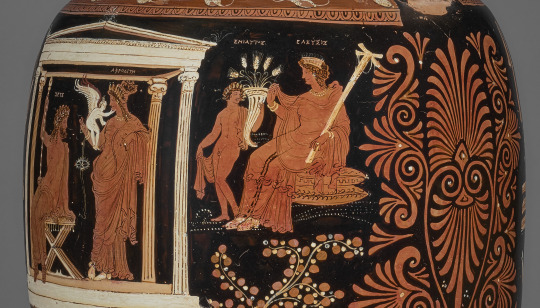
Detail of Apulian red-figure loutrophoros with Zeus and Aphrodite (left) and Eniautos and Eleusis (right). Attributed to the Painter of Louvre MNB 1148. Greek, Classical Period, c. 330 B.C. In the collection of the J. Paul Getty Museum.
Description from the Getty:
To the right sits Eleusis, the personification of the Greek town that was home to the Eleusinian Mysteries, an annual festival that promised its initiates good harvests and a happy afterlife. She is accompanied by a young boy bearing a cornucopia full of wheat. Conveying the idea of agricultural fertility and so an appropriate companion for Eleusis, he is named as Eniautos, the personification of the Year.
#detail#vase painting#terracotta#loutrophoros#red-figure#ancient art#Greek#Apulia#Classical Period#Getty Museum#J. Paul Getty Museum#Eleusis#Eniautos#Eleusinian Mysteries
28 notes
·
View notes
Text
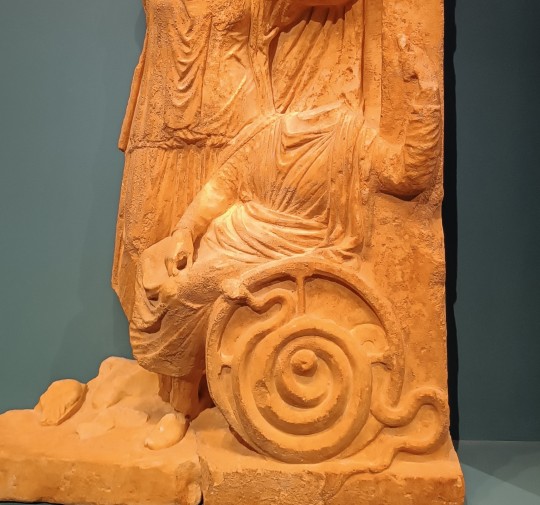
FREAKING TRIPTOLEMUS and his chariot which my entire family agrees looks like a wheelchair, which. The design potential!!!!
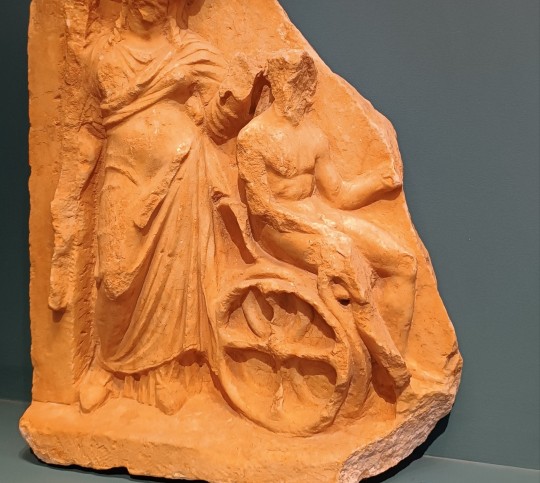
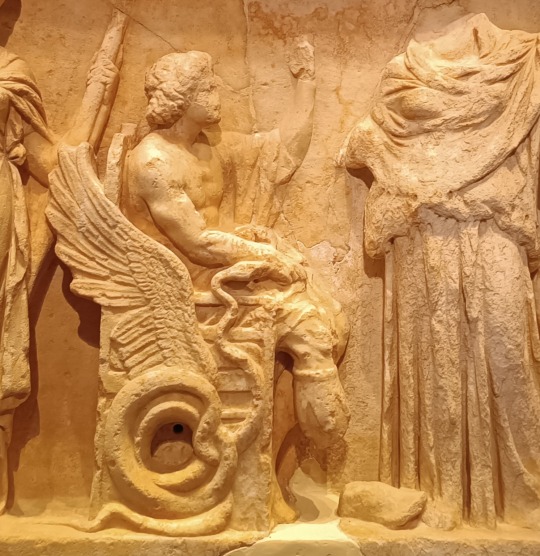
Pics from my eleusis visit from yesterday.
150 notes
·
View notes
Text
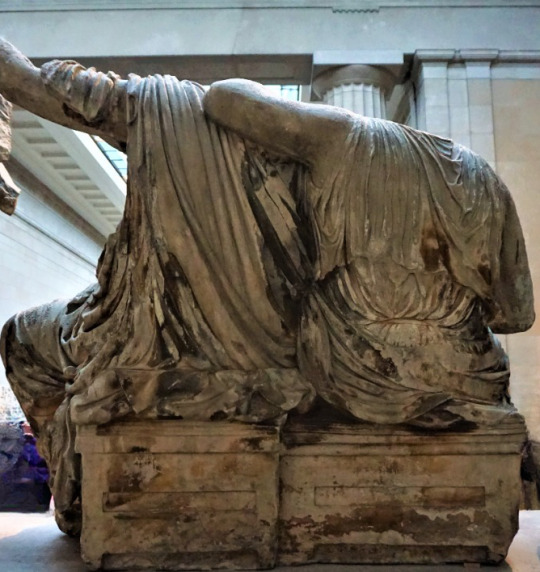
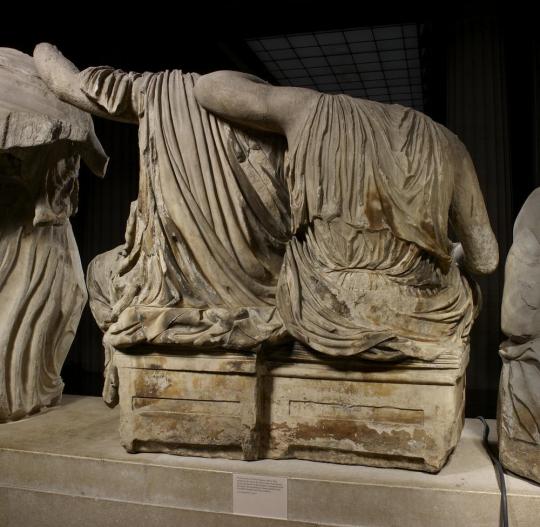
Rear views of Lady Demeter and Queen Persephone from the east pediment of the Parthenon. Both goddesses sit on boxes which may be linked to the Eleusinian mysteries 🏛
#demeter#persephone#parthenon#east pediment#british museum#marble#elgin marbles#phidias#birth of athena#eleusinian mysteries#🏛🏺
266 notes
·
View notes
Text
thinking about persephone again
[i encourage everyone to read the homeric hymn to demeter its my favorite piece of literature and i think about it frequently.]
thinking about how she was simply a young girl picking flowers. something that should have been her sanctuary. she's a goddess of life. her mother is demeter. why should she be cautious in the arms of the earth that built her?
about how she was betrayed by her father, her grandmother, and her uncle all in one day.
"He seized her against her will, put her on his golden chariot, 20 And drove away as she wept. She cried with a piercing voice, calling upon her father [Zeus], the son of Kronos, the highest and the best. But not one of the immortal ones, or of human mortals, heard her voice. Not even the olive trees which bear their splendid harvest."
those lines always crush me.
"So long as the earth and the star-filled sky were still within the goddess’s [Persephone’s] view, as also the fish-swarming sea [pontos], with its strong currents, 35 as also the rays of the sun, she still had hope that she would yet see her dear mother and that special group, the immortal gods. For that long a time her great noos was soothed by hope, distressed as she was."
noos means mind, if im correct. she still has hope in the gods. even after this terrible act upon her. at this point her innocence is still intact as she longs for her mother.
"And the Lady Mother [Demeter] heard her. 40 And a sharp akhos seized her heart."
if im not mistaken, akhos translates to a terrible grief. quaking rn this isn't a love story this is a tragedy.
over and over demeter begs for respect from her fellow gods and goddesses, pleading for help in the search for her daughter. and no one dared to listen to her until the wrath and will of demeter could no longer be ignored.
the wrath of a mother cast the earth in wilting death, and olympus could no longer ignore her.
and even then, when they called upon her, she did not listen till they threw down their pride and obeyed her.
and when they finally heed her words, hades obeys, but not without a trick. he litters persephone with sweet words of how he is to be good to her... until she rushes to leave, and the sharade falls flat.
“So then, Mother, I shall tell you everything, ........ I sprang up for joy, but he, stealthily, put into my hand the berry of the pomegranate, that honey-sweet food, and he compelled me by biē to eat of it."
biē.
biē translates to force/violence. I CANNOT BE NORMAL ABOUT THIS STORY. PERSEPHONE DID NOT CHOOSE THIS LIFE.
even when demeter does everything in her power, even when she forces the hand of olympus, the love of a mother is not respected by the gods. the patriarchy of olympus is very evident.
.
don't get me wrong, i enjoy many modern interpretations of hades and persephone. but ive yet to see one done right. but i didn't write a whole ass essay on why modern interpretations miss the point of the original story for nothing. shaking the bars of my enclosure rn.
i cannot wait to learn greek and latin ill be unstoppable once i can read it without a translation. one day ill be in the room where this discussion can be had and i can get all this passion out of my head.
#im not just a fanfic blog#im also a rabid classical literature fanatic#considering making a sideblog for classics commentary#lynn speaks!#classics#classical literature#hades and persephone#demeter#persephone#hades#literary analysis#literary criticism#commentary#greek mythology#ceres#prosperine#homeric hymns#homeric hymn to demeter#kore#mythology#ancient greece#eleusinian mysteries
48 notes
·
View notes
Text
In the last analysis, the rape-that is, the symbolic death-of Persephone had great consequences for humanity. As the result of it, an Olympian and benevolent goddess temporarily inhabited the kingdom of the dead. She had annulled the unbridgeable distance between Hades and Olympus. Mediatrix between the two divine worlds, she could thereafter intervene in the destiny of mortals. Using a favorite expression of Christian theology, we could say: felix culpa! Just so, the failed immortalization of Demophön brought on the shining epiphany of Demeter and the foundation of the Mysteries.
A History of Religious Ideas by Mircea Eliade
#op#hellenic polytheism#helpol#persephone#eleusinian mysteries#demeter#mysticism#spirituality#theologia#tertiary sources
17 notes
·
View notes
Text
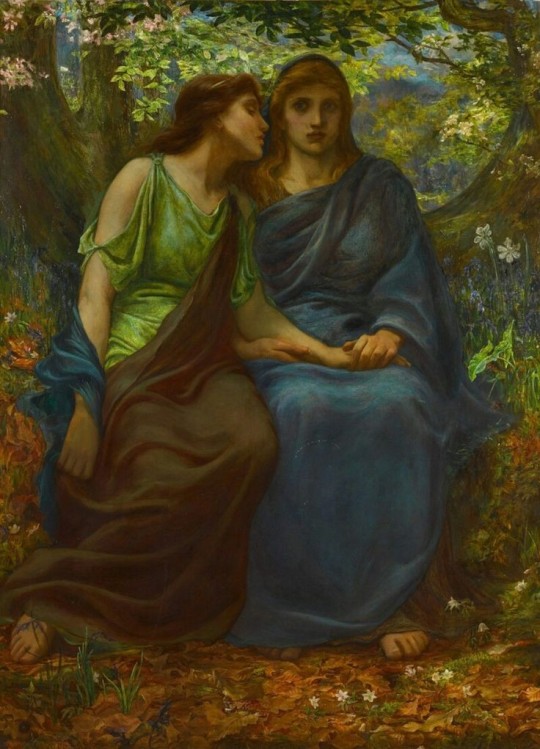
Faces/Gods/Heroes participating in the Eleusinian drama: Although we may not know exactly how the plot unfolded or what roles each hero or god played we find these present (our source is ancient art depicting facets of the Mysteries): Triptolemus, first priest of the Mysteries and son of the Eleusinian King Celeus, goddess Demeter, mother of Persephone (usually mentioned as Kore), Persephone, queen of the Underworld, Dionysus in his role as Pluto, Semele, mother of Dionysus. Elsewhere we find: Demeter accompanied by the child Pluto and her daughter Persephone, the hero Eubouleus, Triptolemus, Herakles, Dionysus, again Dionysus' mother Semele. Other persons: Aphrodite, goddess of the divine marriage to happen, Hermes and Athena, liitle child Iacchus, Zeus in his throne, close to him Hera.
Art: Demeter and Persephone by John D Batten
#mythology#art#symbolism#ancient greece#greek gods#mysticism#eleusis#greek myths#eleusinian mysteries#heroes#gods#demeter#pluto#persephone#semele#dionysus#john d batten#initiation
41 notes
·
View notes